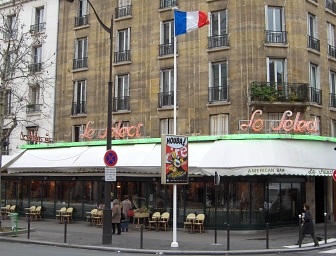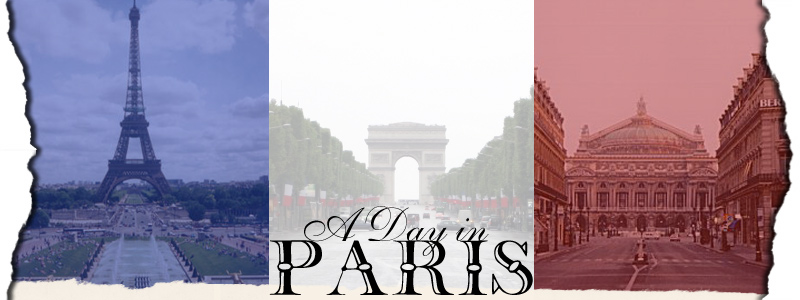Monday, February 14, 2005
Les Années Folles
I woke up feeling much better today. Not that I had much choice with my husband out of town and two kids that needed to be walked to school. The mother of my son's friend offered to walk my kids to school, but I felt well enough to do it. However, I wasn't prepared for the cold and wind! It actually hailed here yesterday, but I never left the apartment. I was in for a shock of winter this morning.Another motivation to get up and going was a special breakfast with my walking tour group. Our tour guide Jacques gave a little talk on Les Années Folles -- the famous Americans in Paris and the famous French in the United States during the Crazy Years (roughly 1919-1929)-- over croissant and café.
After WWI, Paris became an intellectual and artistic center. The Montmartre and Montparnasse areas were magnets for new, 20th century creations of surrealism, art deco and jazz. Young, often impoverished American writers including Hemingway and Fitzgerald would socialize with the intellectual community at four literary cafés on the boulevard Montparnasse -- la Coupole, le Select, la Rotonde, and le Dôme. We met at Le Select for breakfast today.
At the breakfast we heard about the many famous Americans in France in the 20s but one person stood out for me... Josephine Baker. Ms Baker was amazing! According to Jacques, Ms Baker was the first woman to get on a popular Parisian stage (as opposed to the seedy places) and perform bare breasted. Who knew that this bare breasted stuff was started by an American in Paris??
More importantly, Ms Baker was an intelligence informant for the French Resistance. She would perform on stage for the Germans, find out secret information, and pass it on to the Americans with invisible ink on her sheet music. As a result of this work, she was awarded the highest honors the French can bestow: the Croix de Guerre, Rosette de la Resistance and the Legion d'Honneur. Upon her death, at age 68, she was accorded a full-scale, 21-gun salute State Funeral at the Church of the Madeleine in Paris, the first woman of American birth ever to be so honored in France. There were 20,000 people in attendance. On February 2, 2001, the city of Paris paid tribute to Josephine Baker by dedicating "place Josephine Baker" in the Montparnasse area.
Le Select.

-- said Auntie M in Paris
2:57 PM
# posted by Anonymous : 5:06 PM
Notwithstanding the "Crazy Years" appellation, the French "Années Folles" is commonly translated as our "Roaring Twenties", much as the "La Belle Epoque" is rendered as "The Gay Nineties". Hemingway and Fitrzgerald were not really impoverished – few Americans in Paris were, as a matter of fact, since the very, very strong post-WWI dollar went a long, long way against the constantly-falling French franc. The poor French were paying for WWI, remember. One of the big issues, which caused enormous anti-US feeling during the entire decade, was the insistence by Washington that the French nation (and the British) repay the WWI loans extended by the USA. What ended up happening finally was that a) the USA loaned money to Germany which b) had to pay "war reparations" ($32 billion: an astronomical sum at the time) to France and Britain which then c) used these "war reparations" to repay their debt(s) to the USA ! All this was very messy and caused enormous hard feelings on all sides. The charade ended in 1931, when President Hoover finally declared a moratorium on the debt(s).
One of the better authors about all this ("Americans in Paris in the 1920s" generally, not the war debt issues, I hasten to clarify !) is a fellow named Sisley Huddleston. Well before American academics and Hollywood conspired to deform, plagarize, mythologize and frankly rewrite the stories of both male and female Americans in Paris during the 1920s (allegedly termed "The Lost Generation" by Gertrude Stein, no less), Huddleston was busily chronicling the doings in Montparnasse and, more generally, in Paris. His "In and About Paris" (1927) and "Paris Salons Cafes, Studios: Being Social, Artistic and Lterary Memories" (1928) are both "must reads" even today, if one is interested in what can be called, for want of a better term, "The Gertrude FitzHemPassos Legend". The whole idea of impecuniousness came along a decade later, in the 1930s, with the advent of the unabashedly poor Henry Miller, he of "Tropics" fame. The traditional French idea of poor "Bohemian" writers and artists became inextricably mixed with the Lost Generation, which Miller had missed by a few years.
Well before the concept of "diversity" became très à la mode, Josephine Baker had legally adopted twelve (12 !) children of various colors, races, national origins and genders. She called her kids "La Tribu Arc-en-Ciel" ("The Rainbow Tribe").
L'Amerloque
# posted by L'Amerloque : 5:38 PM
Notwithstanding the "Crazy Years" appellation, the French "Années Folles" is commonly translated as our "Roaring Twenties", much as the "La Belle Epoque" is rendered as "The Gay Nineties". Hemingway and Fitzgerald were not really impoverished – few Americans in Paris were, as a matter of fact, since the very, very strong post-WWI dollar went a long, long way against the constantly-falling French franc. The poor French were paying for WWI, remember. One of the big issues, which caused enormous anti-US feeling during the entire decade, was the insistence by Washington that the French nation (and the British) repay the WWI loans extended by the USA. What ended up happening finally was that a) the USA loaned money to Germany which b) had to pay "war reparations" ($32 billion: an astronomical sum at the time) to France and Britain which then c) used these "war reparations" to repay their debt(s) to the USA ! All this was very messy and caused enormous hard feelings on all sides. The charade ended in 1931, when President Hoover finally declared a moratorium on the debt(s).
One of the better authors about all this ("Americans in Paris in the 1920s" generally, not the war debt issues, I hasten to clarify !) is a fellow named Sisley Huddleston. Well before American academics and Hollywood conspired to deform, plagarize, mythologize and frankly rewrite the stories of both male and female Americans in Paris during the 1920s (allegedly termed "The Lost Generation" by Gertrude Stein, no less), Huddleston was busily chronicling the doings in Montparnasse and, more generally, in Paris. His "In and About Paris" (1927) and "Paris Salons Cafes, Studios: Being Social, Artistic and Lterary Memories" (1928) are both "must reads" even today, if one is interested in what can be called, for want of a better term, "The Gertrude FitzHemPassos Legend". The whole idea of impecuniousness came along a decade later, in the 1930s, with the advent of the unabashedly poor Henry Miller, he of "Tropics" fame. The traditional French idea of starving "Bohemian" writers and artists living in garrets became inextricably linked to the Lost Generation, which Miller had missed by a few years.
Well before the concept of "diversity" became très à la mode, Josephine Baker had legally adopted twelve (12 !) children of various colors, races, national origins and genders. She called her kids "La Tribu Arc-en-Ciel" ("The Rainbow Tribe").
L'Amerloque
# posted by L'Amerloque : 5:41 PM
# posted by kim : 5:50 PM
L'A, I am interested in learning more about this time in Paris. I will see if I can buy one of the Huddleston books. Thanks for passing on the info.
# posted by Auntie M in Paris : 5:56 PM
# posted by Auntie M in Paris : 5:57 PM
# posted by pismire : 6:27 PM
You'll have to contend with Hemingway grinding a couple axes that he's been holding onto - especially when it comes to Fitzgerald and Stein - but there are chapters that are just amazing when it comes to transporting you to that time and place.
All in all, it's a great book and one that you can probably get through quite quickly given Hemingway's spare prose.
Lawrence
# posted by Anonymous : 8:11 PM
# posted by Anonymous : 10:09 PM
Lawrence, I'm ashamed to say I haven't read A Moveable Feast. It's on my list now!
A, I checked and checked again, and I wrote WWI and not WWII. But I appreciate corrections when errors are made.
# posted by Auntie M in Paris : 11:01 PM
I visited Baker's estate in Dordogne -- quite a place!
I would also recommend Hemingway's book for a peek at this era. A good short stoy is Fitzgerald's Babylon Revisited.
Speaking of books, have you been to Tea & Tattered Pages?
You may be able to find the documentary at WH Smith. I checked online, but only Amazon.fr had it, though it's currently unavailable.
# posted by RighteousBiche : 4:49 AM
RE: "Paris Was A Woman"
The traditional outlets are more and more useless.
There are two DVDs currently (15 February 2004) available on eBay USA for about US$17/18 each, plus shipping. Note that these appear to be "Region 1" DVDs, so over here in France one needs a "multiregion" DVD player or what the French call "un lecteur dézoné". Most players are "dézonable". (smile)
L'Amerloque
# posted by L'Amerloque : 11:07 AM
It seems that there was a lot more to Josephine Baker that meets the eye, er, if you see what I mean!
# posted by Anji : 3:36 PM
I am a new member and it is a fabulous site!! - I look forward to chatting with you - Warm Regards, - Tess Dauprey
# posted by Anonymous : 1:56 PM















